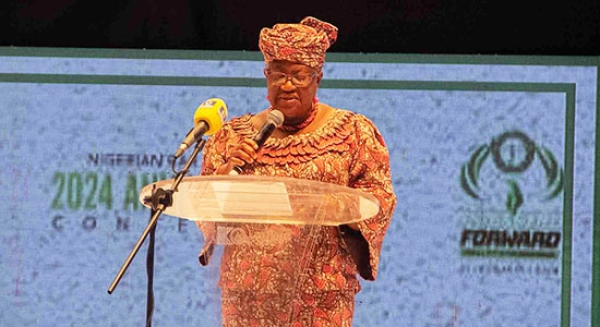Ngozi Okonjo-Iweala, Director General of the World Trade Organisation (WTO), has highlighted that Nigeria’s average Gross Domestic Product (GDP) growth rate has been steadily declining since 2014, indicating a downturn in the economic well-being of Nigerians.
Speaking at Sunday’s Nigerian Bar Association (NBA) annual general conference, Okonjo-Iweala noted that Nigeria’s economic fortunes reversed following a decade of positive growth between 2000 and 2014 when the average GDP growth rate was approximately 3.8%. During this period, GDP growth outpaced the nation’s population growth by around 2.6% annually.
However, the situation has deteriorated since 2014, with GDP growth showing a negative rate of 0.9%. Okonjo-Iweala attributed this to the government’s inability to sustain the positive growth of previous administrations.
“Many of the significant challenges the NBA faces today are rooted in Nigeria’s failure to maintain the rate of economic growth that consistently outpaced our population growth. We had periods of reform and faster economic growth not solely dependent on oil prices. Still, we failed to build on these gains, leading to diminished job prospects and reduced well-being for many Nigerians,” she said.
She emphasized that between 2000 and 2014, Nigeria enjoyed an average GDP growth rate of 3.8%, significantly above the 2.6% population growth rate, which improved living standards. In contrast, the following decade saw an average annual GDP per capita growth of -0.9%, indicating a decline in living standards due to a lack of sustained positive growth momentum.
To address these issues, Okonjo-Iweala called for sustained good economic policies regardless of the administration or political party in power. She argued that policy inconsistencies have contributed to Nigeria’s economic fortunes’ reversal and advocated for a social contract between the government and the people that transcends political changes.
“Maintaining good economic and social policies, ensuring policy consistency, and implementing additional reforms will help guide Nigeria towards the progress we all desire,” she added.
Recent data from the National Bureau of Statistics (NBS) shows that Nigeria’s GDP growth rate declined to 2.98% in the latest quarter, down from 3.46% in the previous quarter but higher than the 2.31% recorded in the corresponding quarter of 2023.


